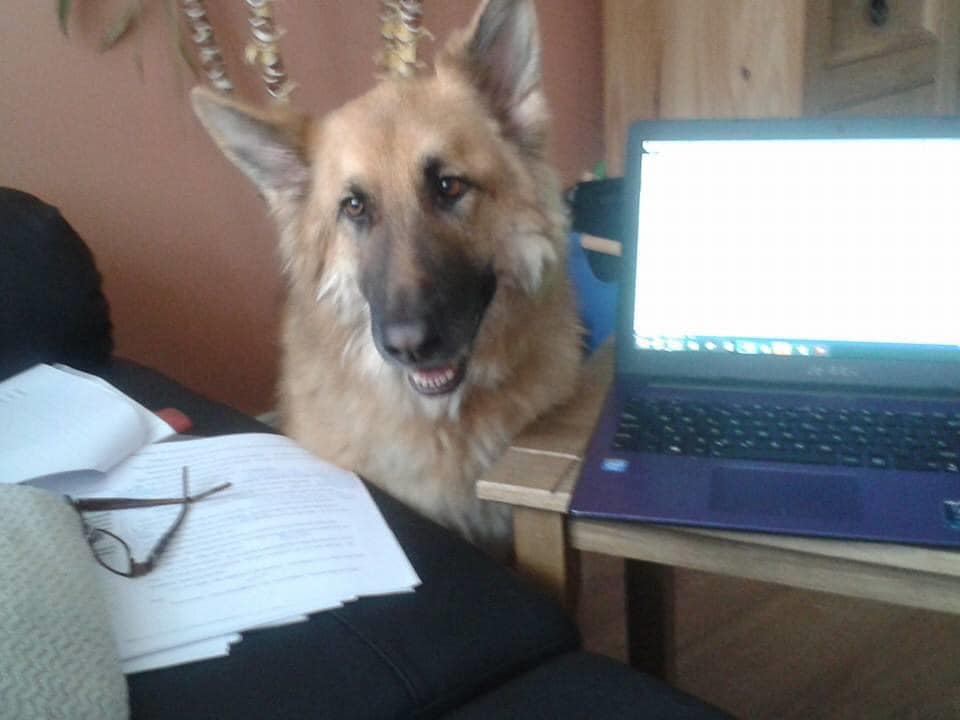Welcome to the second instalment of ‘Writing to Help Yourself.’ This is a monthly blog, written to inspire other writers who want to use the power of writing to support them through difficult events and circumstances.
If prefer to watch and listen, this blog is also available as a video through my YouTube channel.
I’ll focus on a different theme each month, and am open to suggestions if there is anything you would like me to tackle.
There is no doubt that the page can be a writer’s friend, and the process of writing can offer a wonderful outlet through tricky times.
It also presents the bonus of not only helping you, but can perhaps support someone else, experiencing the same situation, perhaps at a later date.
Once a little time has elapsed, and you have found your own way through, an event shared through the page can be a real comfort to another person going through the same thing.

This month the attention is on the loss of a pet, the inevitable price that’s paid for the love and companionship we share with animals.
Right at the start of lockdown, one of the ladies on my Write a Collection of Poetry in a Year course, lost her dog. I remember feeling huge sympathy and thinking to myself that at least she would have an emotional outlet, through her writing, to help her through it a little.
As someone who had never lost a pet at that point, I could only imagine what she must be suffering but then, a fortnight later, my beloved dog of eleven years (pictured below) had to be put to sleep. It was agony. The first night, I tried to write ‘a letter’ to her, just to get what I hadn’t managed to say to her off my chest. It helped.
I couldn’t write any more about her for a month or so afterwards and I’ve never dared to read that letter back as yet. However, two months on, I’ve been able to make her the subject of a sonnet, which I will share with you now.

We Didn’t Say Goodbye
You could have taken me back for one last night,
until a final goodbye the next day.
But to spare me the pain I couldn’t have grasped,
you just let me slip calmly away.
If only I could have lived forever.
I never wanted to leave you alone.
My life was filled with the happiest days,
I couldn’t have wished for a better home.
To remind me of the love you gave,
a piece of your heart, I’ve taken with me.
Somehow, I’ll still walk beside you,
and part of the family, I’ll always be.
I did not want to see you cry, and
that’s why I left, without saying goodbye.
To write about her made me feel close to her, and helped me to make sense of my jumbled emotions and feelings. Any writing I do also provides me with a lasting legacy to her memory.
Of course, when we pick apart something that has traumatised us through our writing, we can do it just for ourselves – there’s nothing to suggest it ever has to see the light of day.
So, I’m now going to list a few activity suggestions that may help other pet owners. It may help you to work from a picture of your pet.
- As I have, you could write ‘a letter from the other side’ from your pet, to you.
- You could also write directly to your pet, remembering the time you spent together.
- As I did last month, when I talked about ‘empty nest syndrome,’ you could write an inverted poem, where you start with the end, and work back, to the beginning.
- No doubt you will have specific tales and adventures to recount, of time spent with your pet. Bring these stories back to life as a mini short story collection.
- Write a diary entry of the first time you met your pet.
These tasks can be done at the time of the trauma, or in anticipation of it. For many writers, they are probably best done as reflections.
A free writing approach could be used initially to capture that raw emotion, and then it could be weaved into a poem, a reflective narrative or a piece of poetic prose.
Hopefully no one reading this will be experiencing this right now. But perhaps, if there is anything unresolved from your experience of losing a pet, you might want to tackle it retrospectively.
The sad fact of having an animal is that their life expectancy is much shorter than ours. The price we pay for their love is eventual grief.
Let me know in the comments, or by dropping me an email, which writing activity you choose and how you get on with it.
I’ll be back next month with another topic – we’ll make the topic more ‘optimistic’ next time, and explore the issues surrounding ‘career change’ through our writing.
And for even more optimism, check out the 12 days of summer writing (a free mini writing course,) on my YouTube channel.
Bye for now,
With best wishes, Maria Frankland
If you need more support with any of the issues contained within this blog post, the following links should be really helpful:
https://hound101.com/tips-for-coping-when-your-dog-dies/
https://www.helpguide.org/articles/grief/coping-with-losing-a-pet.htm
https://www.bluecross.org.uk/pet-bereavement-and-pet-loss
I write my blogs and record my videos to support, motivate and inspire other writers. I love doing this, and it is freely given. However, I do have a Patreon page where writers can also support me, by way of donating the equivalent of 'a coffee a month.'
Everyone who supports me gets:
- Access to ten 'The Foundations of Writing' helpsheets
- A free signed paperback (after 6 months of being a patron)
- An invite to submit questions and take part in the monthly writer's Q&A.

1 thought on “Writing to Help Yourself Part 2 – Loss of a Pet”
Comments are closed.